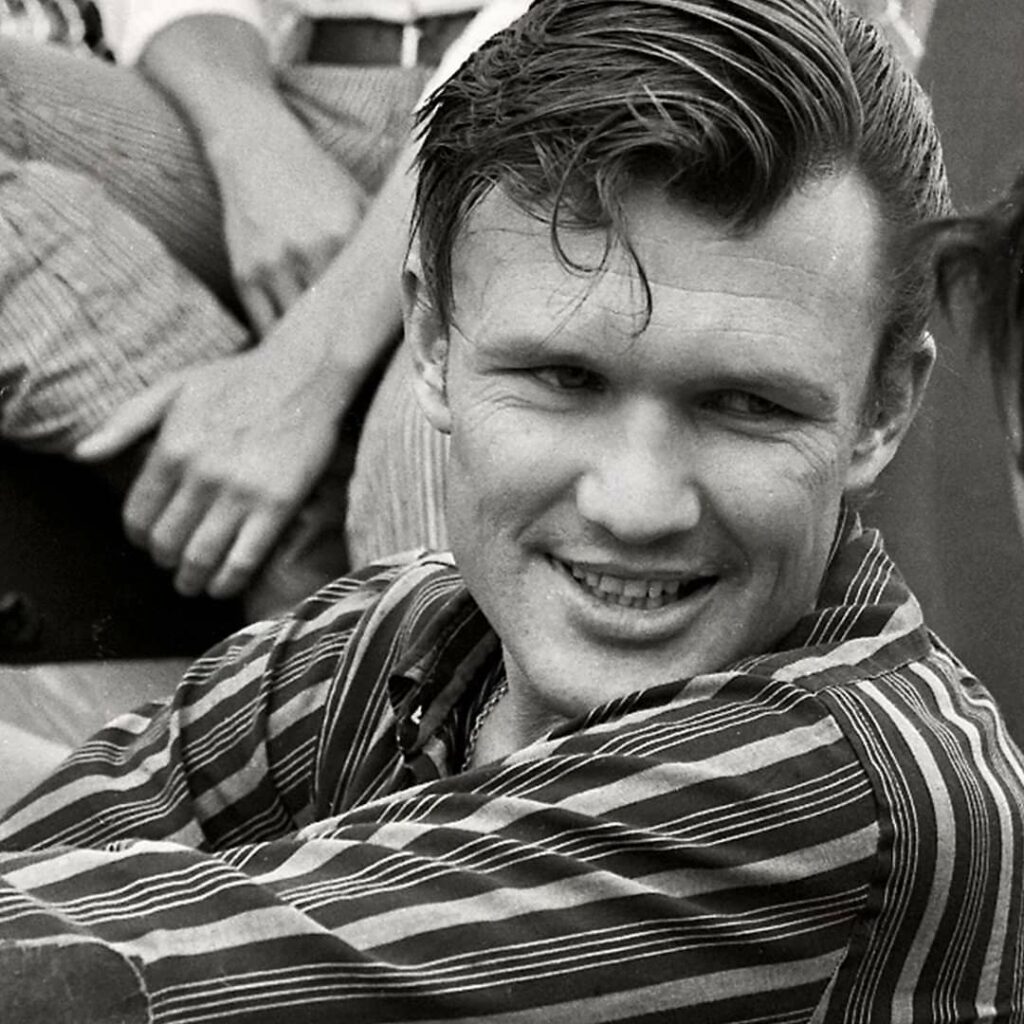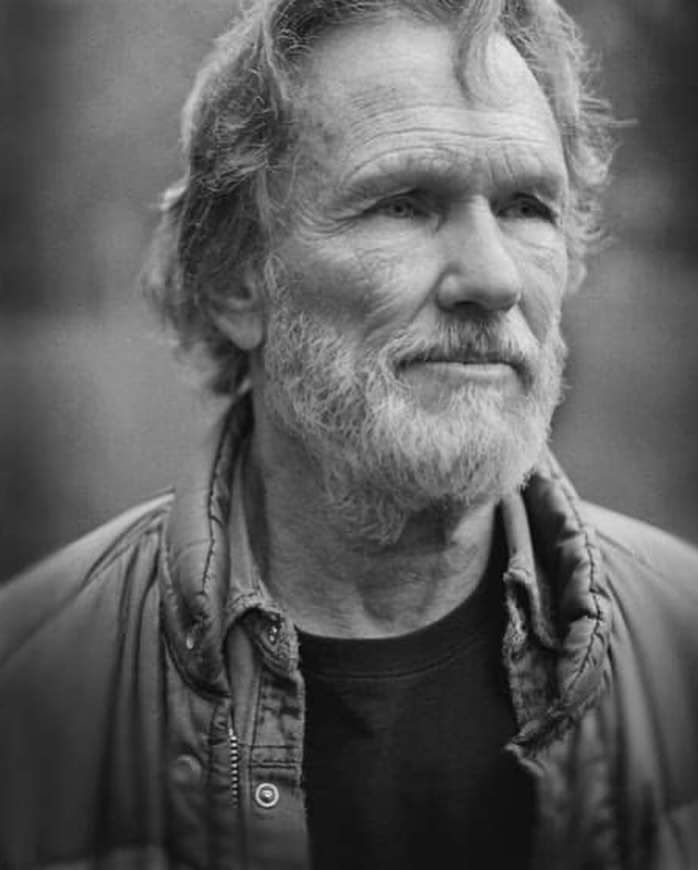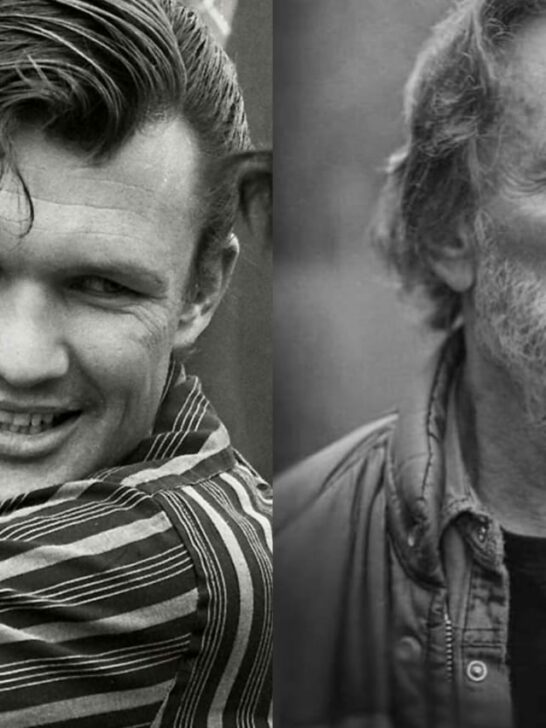I sometimes like to say I wouldn’t exist without Kris Kristofferson. That sounds like I’m implying that his music has carried me through some tough times. It has, but I actually mean I would never have been born. According to my mother, she accepted my father’s romantic overtures because he reminded her of Kris. Thus, my little brother and I.
While I was still in my crib, my father would play mix tapes he made for me, and the three most prominent featured artists were Dylan, Prine, and Kristofferson. There’s probably never been a more successful experiment in whether music can influence a baby’s developing selfhood, because I rejected that music for as long as I could but eventually had to concede that it is indeed my lifeblood. Those three are all holy to me. But I bring this up to say that Kristofferson’s growl, his burl of a voice, was literally vibrating my infant bones, even if his actual words were still just a sonic smear.
But if I couldn’t hear lyrics then, it didn’t take long; I started listening attentively to lyrics at a very young age, even if their meaning wasn’t always totally apparent to a child. So when I told my mom I wanted to be the Silver-Tongued Devil for Halloween, I thought it was a song about a cool monster and not a man who becomes a womanizer whenever he drinks. It’s kind of funny, kind of dark. Like the song, I guess.

When I learned about who Kristofferson was as a man—boxer, pilot, Army Ranger; but also Rhodes Scholar, singer, poet—he became I guess a beacon of a kind of idealized masculinity, as I think he has been for a lot of boys and men who are attracted to a rugged, traditional masculine archetype but want to see if they can express it in a way that is thoughtful and intelligent.
When I became a songwriter, his lyrics were a touchstone. As mentioned, I’m a huge Dylan fan—he’s my favorite artist—but I don’t think he can be emulated. Actually, speaking of boxers, it reminds me of something I learned when I was boxing. Everyone loves Muhammad Ali and a lot of hopefuls come into gyms wanting to look like him in the ring. A coach quickly told me that this was a terrible idea. Ali did everything wrong: he kept his hands down; he leaned back from punches; he never went to the body. But he was able to get away with these things, to use them in fact to his advantage, to become the Greatest, because he was, basically, a freak of nature.
Dylan’s the same way. A freak. What’s dangerous about Dylan is that his writing, at least in the 60s, was so seemingly uncontrolled, spinning off into dervishes of language that sounded always on the verge of collapsing into pure imagism but somehow managed to contain meaning you could apply to your life. You’ll fall on your ass trying to be Dylanesque—thousands have, especially in the 60s and 70s. His spell was so pervasive that even his fellow greats had moments when they were clearly trying to copy him, and not to their benefit. When Townes wrote “Pancho and Lefty” he was writing in a voice all his own, but when he wrote, in “Why She’s Acting This Way,” “take your Tinkerbell lies/and your weary desires/take the tears in your eyes/and your cup full of fire,” he’s reaching for “Sad-eyed Lady of the Lowlands” and falling short.
Kris was pretty unique in that, although he professed intense admiration for the man, he did not seem to be influenced by Dylan. Maybe because of his background in scholarship, his formal writing training, he had a different approach, using plain language with such effortless mastery that everyday words manage to create novel poetic effects and contain deep emotional truths while nimbly sidestepping cliche.

In a way, he took the basic architecture of the Hank Williams model and put a new coat of paint on it. Hank really did put the scaffolding of modern confessional songwriting in place, and in some ways no one has done it better—even now. But look at what Kris did with it. Look at these languid lines that spilled out of Hank’s pen in the 40s, with their soft, easy rhythm and the way the syllables unspool:
𝑇ℎ𝑒𝑟𝑒 𝑤𝑎𝑠 𝑎 𝑡𝑖𝑚𝑒 𝑤ℎ𝑒𝑛 𝐼 𝑏𝑒𝑙𝑖𝑒𝑣𝑒𝑑
𝑡ℎ𝑎𝑡 𝑦𝑜𝑢 𝑏𝑒𝑙𝑜𝑛𝑔𝑒𝑑 𝑡𝑜 𝑚𝑒
𝐵𝑢𝑡 𝑛𝑜𝑤 𝐼 𝑘𝑛𝑜𝑤 𝑦𝑜𝑢𝑟 ℎ𝑒𝑎𝑟𝑡 𝑖𝑠 𝑠ℎ𝑎𝑐𝑘𝑙𝑒𝑑
𝑡𝑜 𝑎 𝑚𝑒𝑚𝑜𝑟𝑦
𝑇ℎ𝑒 𝑚𝑜𝑟𝑒 𝐼 𝑙𝑒𝑎𝑟𝑛 𝑡𝑜 𝑐𝑎𝑟𝑒 𝑓𝑜𝑟 𝑦𝑜𝑢
𝑡ℎ𝑒 𝑚𝑜𝑟𝑒 𝑤𝑒 𝑑𝑟𝑖𝑓𝑡 𝑎𝑝𝑎𝑟𝑡
𝑊ℎ𝑦 𝑐𝑎𝑛’𝑡 𝐼 𝑓𝑟𝑒𝑒 𝑦𝑜𝑢𝑟 𝑑𝑜𝑢𝑏𝑡𝑓𝑢𝑙 𝑚𝑖𝑛𝑑
𝑎𝑛𝑑 𝑚𝑒𝑙𝑡 𝑦𝑜𝑢𝑟 𝑐𝑜𝑙𝑑, 𝑐𝑜𝑙𝑑 ℎ𝑒𝑎𝑟𝑡?
Now look at Kris:
𝑊𝑎𝑘𝑖𝑛𝑔 𝑖𝑛 𝑡ℎ𝑒 𝑚𝑜𝑟𝑛𝑖𝑛𝑔
𝑡𝑜 𝑡ℎ𝑒 𝑓𝑒𝑒𝑙𝑖𝑛𝑔 𝑜𝑓 ℎ𝑒𝑟 𝑓𝑖𝑛𝑔𝑒𝑟𝑠 𝑜𝑛 𝑚𝑦 𝑠𝑘𝑖𝑛
𝑊𝑖𝑝𝑖𝑛𝑔 𝑜𝑢𝑡 𝑡ℎ𝑒 𝑡𝑟𝑎𝑐𝑒𝑠
𝑜𝑓 𝑡ℎ𝑒 𝑝𝑒𝑜𝑝𝑙𝑒 𝑎𝑛𝑑 𝑡ℎ𝑒 𝑝𝑙𝑎𝑐𝑒𝑠 𝑡ℎ𝑎𝑡 𝐼’𝑣𝑒 𝑏𝑒𝑒𝑛
𝑇𝑒𝑎𝑐ℎ𝑖𝑛𝑔 𝑚𝑒 𝑡ℎ𝑎𝑡 𝑦𝑒𝑠𝑡𝑒𝑟𝑑𝑎𝑦
𝑤𝑎𝑠 𝑠𝑜𝑚𝑒𝑡ℎ𝑖𝑛𝑔 𝑡ℎ𝑎𝑡 𝐼 𝑛𝑒𝑣𝑒𝑟 𝑡ℎ𝑜𝑢𝑔ℎ𝑡 𝑜𝑓 𝑡𝑟𝑦𝑖𝑛𝑔
𝑇𝑎𝑙𝑘𝑖𝑛𝑔 𝑜𝑓 𝑡𝑜𝑚𝑜𝑟𝑟𝑜𝑤 𝑎𝑛𝑑 𝑡ℎ𝑒 𝑚𝑜𝑛𝑒𝑦, 𝑙𝑜𝑣𝑒
𝑎𝑛𝑑 𝑡𝑖𝑚𝑒 𝑤𝑒 ℎ𝑎𝑑 𝑡𝑜 𝑠𝑝𝑒𝑛𝑑
𝐿𝑜𝑣𝑖𝑛𝑔 ℎ𝑒𝑟 𝑤𝑎𝑠 𝑒𝑎𝑠𝑖𝑒𝑟 𝑡ℎ𝑎𝑛 𝑎𝑛𝑦𝑡ℎ𝑖𝑛𝑔 𝐼’𝑙𝑙 𝑒𝑣𝑒𝑟 𝑑𝑜 𝑎𝑔𝑎𝑖𝑛
It’s not Dylan with his:
𝐷𝑖𝑠𝑖𝑙𝑙𝑢𝑠𝑖𝑜𝑛𝑒𝑑 𝑤𝑜𝑟𝑑𝑠 𝑙𝑖𝑘𝑒 𝑏𝑢𝑙𝑙𝑒𝑡𝑠 𝑏𝑎𝑟𝑘
𝐴𝑠 ℎ𝑢𝑚𝑎𝑛 𝑔𝑜𝑑𝑠 𝑎𝑖𝑚 𝑓𝑜𝑟 𝑡ℎ𝑒𝑖𝑟 𝑚𝑎𝑟𝑘
𝑀𝑎𝑘𝑒 𝑒𝑣𝑒𝑟𝑦𝑡ℎ𝑖𝑛𝑔 𝑓𝑟𝑜𝑚 𝑡𝑜𝑦 𝑔𝑢𝑛𝑠 𝑡ℎ𝑎𝑡 𝑠𝑝𝑎𝑟𝑘
𝑇𝑜 𝑓𝑙𝑒𝑠ℎ-𝑐𝑜𝑙𝑜𝑟𝑒𝑑 𝐶ℎ𝑟𝑖𝑠𝑡𝑠 𝑡ℎ𝑎𝑡 𝑔𝑙𝑜𝑤 𝑖𝑛 𝑡ℎ𝑒 𝑑𝑎𝑟𝑘
It’s plain language illustrating basic truths of the human heart in the Hank Williams mode but … I won’t say “elevated” … perhaps “updated,” made new, kept alive and fresh and vital by Kristofferson who doesn’t improve on country music so much as use his refined skills to interpret it for a new era, without losing the common touch.
A tricky thing, to bring that literary flair while remaining identifiably country, still accessible to anyone with a radio. Takes a subtle, expert hand. Takes a writer. That’s what it said on Kristofferson’s passport: not “Entertainer.” “Writer.”
Kris studied William Blake at Oxford, and that’s another big influence. Blake also used simple language, to get at what are sometimes highly obscure, visionary truths. “A dog starv’d at his Masters Gate/Predicts the ruin of the State.” Somewhere between Hank and Blake, you might have Kris, who sometimes seemed incapable of saying anything in a way that it had been said before, but equally incapable of making his meaning anything but crystal clear.
Like, here’s how he said, “I got drunk, thought about the person I was becoming in Nashville, then decided to leave after work”:
𝑊𝑒𝑙𝑙 𝐼 𝑑𝑟𝑎𝑛𝑘 𝑡ℎ𝑒 𝑤ℎ𝑜𝑙𝑒 𝑡ℎ𝑖𝑛𝑔 𝑜𝑣𝑒𝑟
𝑝𝑢𝑡𝑡𝑖𝑛’ 𝑜𝑛𝑒 𝑎𝑛𝑑 𝑡𝑤𝑜 𝑡𝑜𝑔𝑒𝑡ℎ𝑒𝑟
𝐴𝑛𝑑 𝑖𝑡 𝑎𝑑𝑑𝑒𝑑 𝑢𝑝 𝑡𝑜 𝑚𝑜𝑟𝑒 𝑜𝑓 𝑤ℎ𝑎𝑡
𝐼 𝑑𝑖𝑑𝑛’𝑡 𝑤𝑎𝑛𝑡 𝑡𝑜 𝑏𝑒
𝐼 𝑎𝑖𝑛’𝑡 𝑏𝑙𝑎𝑚𝑖𝑛’ 𝑀𝑢𝑠𝑖𝑐 𝐶𝑖𝑡𝑦
𝑏𝑢𝑡 𝑖𝑡’𝑠 𝑜𝑛𝑙𝑦 𝑔𝑜𝑛𝑛𝑎 𝑠𝑒𝑒 𝑚𝑒
𝑂𝑛𝑒 𝑚𝑜𝑟𝑒 𝑤𝑜𝑟𝑘𝑑𝑎𝑦 𝑎𝑛𝑑 𝑎 𝑤𝑎𝑘𝑒-𝑢𝑝
𝑎𝑛𝑑 𝑡ℎ𝑒 𝑡𝑖𝑚𝑒 𝑖𝑡 𝑡𝑎𝑘𝑒𝑠 𝑡𝑜 𝑙𝑒𝑎𝑣𝑒
It’s easy to dislike people like Kristofferson, who seem naturally good at everything. A devastatingly handsome white guy from a prestigious military family who can fly a helicopter, box, complete Army Ranger training, thrive at the highest levels of academia, quote classical poetry from memory, revolutionize country songwriting, then move into acting and actually excel … it’s almost a bit much.
But the story of Kris is the story of the prince who abdicated. He was being groomed for life as an officer, a professor, even a governor—really, almost anything he wanted—and he gave it all up to become a janitor in Nashville in the hopes that someone, anyone might take a chance on his songs. We all know the story of him flying a helicopter onto Johnny Cash’s lawn and I’m not here to sketch out his life’s Greatest Hits. I’m just saying, the Golden Boy archetype can be difficult to swallow. The prince who abdicated, not so much. The prince who abdicated is a hero.
His family disowned him; his choice cost him everything. All for the sake of externalizing his internal life, because, to use his favorite Blake quote: “If he who is organized by the divine for spiritual communion, refuse and bury his talent in the earth, even though he should want natural bread, shame and confusion of face will pursue him throughout life to eternity.” Which, in case anyone was confused, Kris would then paraphrase as: “He’s telling you that you’ll be miserable if you don’t do what you’re supposed to do.”
And he kept taking chances that might cost him everything. With his politics, for instance. I don’t typically judge an artist by their politics—rather by their art—but what’s significant here is that the stances he took were not wise career moves in the country music industry, then or now. Country isn’t as conservative as its critics like to proclaim, but it’s still pretty conservative. Leftists like to claim Dolly Parton, and she has a huge heart, but she’s also a very savvy businesswoman who knows how to say just enough to woo the left while not losing the right (i.e. she’ll take a stand for women’s rights in general terms, but she’s quiet on abortion). As to her actual politics, what’s often mistaken for leftism is just that she’s a Christian who loves everyone—like gay people or people of other faiths—but she also loves Kid Rock. So it’s easy to cherry-pick the Dolly you want to see, because the truth is something that’s just not part of the online dialogue (i.e. her orientation toward the world is essentially religious, not political). Johnny Cash, often claimed by leftists, was fairly conservative in some ways, but he was also an individualist who eschewed party lines and had a genuine concern for the underdog that he was willing to act on. And these were also times when party lines were less stringent and it was possible to be, say, a flag-waving patriot who supported prison reform, like Cash, whose most succinct statement of his own politics might have been: “I thank God for all the freedoms we’ve got in this country. I cherish them. Even the right to burn the flag. I’m proud of that right. But we’ve also got the right to bear arms, so if you burn my flag I’ll shoot you.” Which, actually—pretty fair.

Kris was on a different trip than these two: he worked with Cesar Chavez and UFW; did benefits for Palestine; recorded an entire album in support of the Sandinistas; lent his money and talents to environmental causes; condemned American foreign policy; and the list goes on and on. He was a leftist, probably the only major country star of this particular political stripe, and I don’t say that to put him above or below Dolly or Johnny—Dolly’s approach of unconditional love may be the most radical of all—but merely to highlight the extent of his bravery, because these were not stances it was advantageous to hold. But he took them anyway, as a man of fierce and unyielding principles. And frankly he was right about a lot of things.
My mom got to see him from the front row some years back when he played the Mendocino Music Festival. I recall listening to her voicemail afterwards and she sounded giddy, like a little girl who’d just seen the Beatles. I enjoyed that. I never did see him but I think about him almost every day. People like him with every advantage in life are, first of all, rarely artists. Second of all, even more rarely are they great artists. But to top it all off with an uncompromising concern for the less fortunate made him not just a great artist but a great human.
As far as the masculinity angle, there’s no one right way to be a man, but the Kris Kristofferson model is one damn good option.
𝐵𝑢𝑡 𝑖𝑓 𝑡ℎ𝑖𝑠 𝑤𝑜𝑟𝑙𝑑 𝑘𝑒𝑒𝑝𝑠 𝑟𝑖𝑔ℎ𝑡 𝑜𝑛 𝑡𝑢𝑟𝑛𝑖𝑛’
𝑓𝑜𝑟 𝑡ℎ𝑒 𝑏𝑒𝑡𝑡𝑒𝑟 𝑜𝑟 𝑡ℎ𝑒 𝑤𝑜𝑟𝑠𝑒
𝐴𝑛𝑑 𝑎𝑙𝑙 ℎ𝑒 𝑒𝑣𝑒𝑟 𝑔𝑒𝑡𝑠 𝑖𝑠 𝑜𝑙𝑑𝑒𝑟 𝑎𝑛𝑑 𝑎𝑟𝑜𝑢𝑛𝑑
𝐹𝑟𝑜𝑚 𝑡ℎ𝑒 𝑟𝑜𝑐𝑘𝑖𝑛’ 𝑜𝑓 𝑡ℎ𝑒 𝑐𝑟𝑎𝑑𝑙𝑒
𝑡𝑜 𝑡ℎ𝑒 𝑟𝑜𝑙𝑙𝑖𝑛’ 𝑜𝑓 𝑡ℎ𝑒 ℎ𝑒𝑎𝑟𝑠𝑒
𝑇ℎ𝑒 𝑔𝑜𝑖𝑛’ 𝑢𝑝 𝑤𝑎𝑠 𝑤𝑜𝑟𝑡ℎ 𝑡ℎ𝑒 𝑐𝑜𝑚𝑖𝑛’ 𝑑𝑜𝑤𝑛
